Multi-Level Approaches to Sustainable Peace in Nigeria’s Middle Belt

Read the full report here
Since August 2022, peacemaking efforts by the Centre for Humanitarian Dialogue (HD) in Nigeria’s Middle Belt have focused on integrating climate adaptation and natural resource management into conflict resolution. HD has facilitated multi-level dialogues resulting in inclusive peace agreements in Benue and Nasarawa states, aiming to reduce violence, foster resilience, and promote sustainable livelihoods.
The report’s findings show two key outcomes:
Outcome 1: Implementation of Inclusive Natural Resource-Sharing Agreements and Climate Adaptation Measures
The evaluation found that the signing of climate-sensitive natural resource peace agreements has led to significant improvements in reducing violence, fostering cooperative resource management and improving livelihoods. Benefiting more than half a million people across Nigeria’s Middle Belt, the agreements – and their ongoing implementation – have strengthened community resilience to climate change and reduced the risk of future conflict.
- Reduced violence and enhanced cooperation
The three HD-facilitated natural resource peace agreements have led to a significant reduction in violent clashes and a marked improvement in intercommunal relations, particularly between farmers and herders. Community members have reported greater interethnic understanding and engagement in collaborative activities. The agreements have also fostered a culture of dialogue, encouraging communities to prioritise peaceful conflict resolution over confrontation.
- Improved natural resource management
The peace agreements have enabled collaborative governance of key natural resources such as water, grazing areas and forests. Communities have established locally led committees to regulate resource access and use, including through rotational systems for accessing grazing areas and water sources. This cooperative approach has not only reduced resource-related disputes, but also promoted sustainable and equitable resource management.
- Climate adaptation progress
The inclusion of climate adaptation provisions in the peace agreements has encouraged communities to adopt climate-smart agricultural practices, such as soil conservation, crop rotation and the protection of pasture from overgrazing. Communities have also started establishing locally led land rehabilitation, afforestation and water conservation initiatives, building community resilience to climatic shocks.
- Improved livelihoods
Community members have reported that the reduction in violence and the establishment of cooperative resource management has significantly improved livelihoods. With conflicts subsiding, community-imposed movement restrictions have been lifted, enabling the reopening of one local market and restoring access to another. This revitalisation of economic activity has enabled farmers, traders and livestock owners to resume trade, improving food security and income opportunities.
Outcome 2: Establishment of Functional Community and State Peace Infrastructures
The evaluation found that the peace infrastructures established or strengthened through the project play an important role in resolving disputes, managing tensions and fostering long-term social cohesion.
- Functional community peace infrastructures
Local peace committees and traditional conflict resolution mechanisms have been established or revitalised. These structures have played a critical role in mediating disputes, monitoring implementation of the agreements and promoting dialogue among community members. Their presence has contributed to sustained stability and effective conflict prevention at the grassroots level.
- Strengthened role of traditional authorities in conflict resolution
Traditional rulers have emerged as central actors in the implementation of the peace agreements. Their legitimacy, rooted in cultural and social authority, has allowed them to play a vital role in enforcing agreements and de-escalating tensions.
- Improved collaboration with local government and institutions
The peace processes have encouraged more active engagement from local government representatives and state-level institutions. Their participation has helped link community-level mechanisms with formal governance structures, increasing institutional support for and the sustainability of the peace agreements.
Share on

